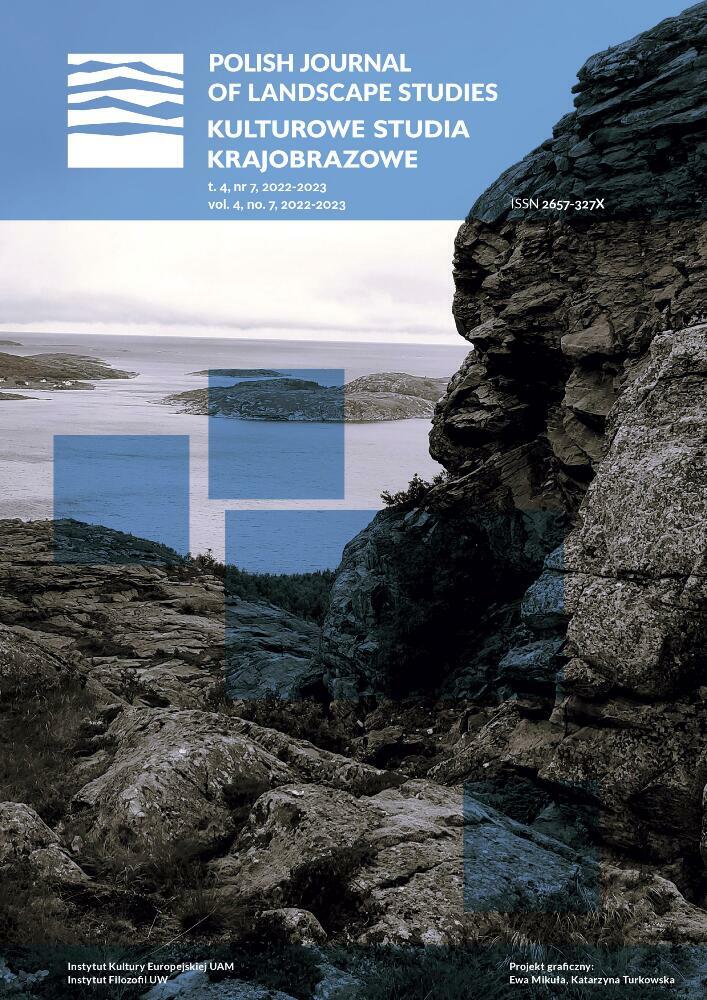Abstract
The main subject addressed in this essay is the idea of landscape approached from a new perspective, namely the aesthetic category of the sublime, as opposed to the historical category of the picturesque. I argue that landscape is something more than an image and a phenomenon, and we should consider it and define anew, since its meaning is both aesthetic and cultural. The re-reading of the sublime as a kind of common sensory experience free of metaphysical connotation offers an insight into the kind of experience accompanying the relationship with the landscape and redefines its essence. In the optics of the sublime, the landscape assumes the nature of a process in which one sees the overlapping of certain socio-cultural relationships and the natural world, as well as the meaning of the surrounding reality, the living, current environment and its sensual perception. We may assume that the significant difference emerging when we try to approach landscape, appears between the landscape as an idea (aesthetic landscape) and the landscape as a process (cultural landscape). Thus landscape is seen as a cultural space of human activity, not a pictorial part of the reality. As such, landscape is related to surroundings. Surroundings are a space of life and activity, while landscape is the space experienced, but both are two aspects of our living-in-the-landscape. Dwelling as the creation of the surroundings is nothing but practice to make landscape present.
The article was first published in Aesthetics of Human Environment.VIIIOvsiannikov International Aesthetic Confe-rence, ed. by. S. Dzikevich, Lomonosov Moscow State University, Moscow 2017, p. 7-19.
References
Burckhardt, J. 1991. Kultura Odrodzenia we Włoszech, Warszawa: Państwowy Instytut Wydawniczy.
Berleant, A. 1992. The Aesthetics of Environment, Philadelphia : Temple University Press.
Berleant, A. 2011. Wrażliwość i zmysły. Estetyczna przemiana świata człowieka. Transl. S. Stankiewicz, Kraków: Universitas.
Berlean,t A. 1997. Living in the Landscape. Toward an Aesthetics of Environment. University Press of Kansas.
Burke, E. 1968. Dociekania filozoficzne o pochodzeniu naszych idei wzniosłości i piękna. Transl. P. Graff, Warszawa: Wydawnictwo Naukowe PWN
Cosgrove, D. 2003. Landscape and the European Sense of Sight – Eying Nature, in: K. Anderson, M. Domosh, S. Pile, N. Thrift (eds.), Handbook of Cultural Geography, London: Sage Publications.
Frydryczak, B. (2013). Krajobraz. Od estetyki the picturesque do doświadczenia topograficznego. Poznań: Wydawnictwo Poznańskiego Towarzystawa Przyjaciół Nauk.
Frydryczak, B. 2020. Zmysły w krajobrazie. Łódź: Officyna.
Haapala, A. 2014. Estetyka codzienności [On the Aesthetics of Everyday]. In: B. Frydryczak, M. Ciesielski (eds.). Krajobraz kulturowy. Poznań: Wydawnictwo Poznańskiego Towarzystwa Przyjaciół Nauk.
Ingold, T. 1993. The Temporality of the Landscape, “World Archeology”, vol. 25, 2. DOI: https://doi.org/10.1080/00438243.1993.9980235
Aesthetics and the processual nature of landscape
Ingold, T., 2000. The Perception of the Environment: Essays on Livelihood, Dwelling and Skill, London-New York: Routledge.
Jackson, J. B. 2008. The World Itself, in: The Cultural Geography Reader, Th. S. Oakes, P. L. Price (ed.), New York: Routledge.
Kant, I. 1987. Critique of Judgement. Transl.Werner S. Pluhar, Hackett Publishing Co.
Lowenthal, D. 2007. Living within and Looking at Landscape, “Landscape Research” 5. DOI: https://doi.org/10.1080/01426390701552761
Olwig, K. R. 2002. Landscape Nature and the Body Politic. From Britain Renaissance to America’s New World. Wisconsin: University of Wisconsin Press.
Sauer, C. 1963. Land and Line. A selection from the Writings of Carl Ortwin Sauer, Berkeley & Los Angeles: University of California Press.
Tuan Y.-F. 1987. Przestrzeń i miejsce, Warszawa: PIW.
License
Copyright (c) 2024 Beata Frydryczak

This work is licensed under a Creative Commons Attribution-NonCommercial-NoDerivatives 4.0 International License.

